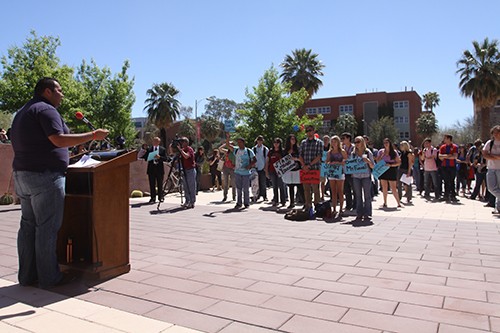Almost a month after the end of the ASUA general election, the ongoing legal wrangling over the disputed presidential election will return to the Supreme Court today for public hearings beginning at 6:30 p.m. in Room 160 of the James E. Rogers College of Law.
The two presidential candidates, James Allen and Daniel Hernandez, were both disqualified from last month’s Associated Students of the University of Arizona general election for receiving an excess of campaign violation checks. Both Allen and Hernandez received 11 checks each, one above the threshold for automatic disqualification. As a result, ASUA elections commissioner Michael Colletti ruled both candidates ineligible.
Allen and Hernandez both appealed their violations to the ASUA Supreme Court, which struck down two checks for each of them. Colletti decided to uphold the disqualification of Allen, who won the general election by a two-to-one vote margin, but not Hernandez.
As a result, Allen is asking the court to overturn Colletti’s decision and declare him the winner of the election. Hernandez, however, is appealing that, as the only eligible candidate remaining in the race, he should be declared the winner should Allen remain disqualified.
Colletti said he decided to uphold Allen’s disqualification because he felt Allen’s violations were unduly disruptive and compromised the integrity of the election. He said he did not feel that way about Hernandez’s violations.
He also said that he did not view the violations committed by Brett and Bryan Ponton, who were elected administrative vice president and executive vice president, respectively, in the same light as Allen’s, despite the candidates being charged with virtually the same violations since they ran on a slate.
Both Brett and Bryan Ponton received nine election violation checks during the general election, one below the level for disqualification.
Hernandez said he decided to appeal to the Supreme Court because he believes he is “”the only legitimate”” candidate left in the election should Allen remain disqualified.
Colletti said that the ASUA Elections Code “”explicitly states”” that if the winner of the election is disqualified, a special election has to be held, though he said the final interpretation of the code rests with the Supreme Court.
Chapter 9-1.01 of the code states: “”(i)f a candidate that is elected to a position (President, Executive and Administrative Vice President, or Senator) and is disqualified a special election set at a later date will occur for said position.””
Hernandez said he plans to argue that, since Allen was disqualified before the end of the general election and the election results have not been verified, he cannot be considered a legitimate candidate. Allen said that, based on his interpretation of the code, if he remains disqualified the only allowable option is a special election.
Hernandez also said he had planned to go forward with the special election, but decided to appeal to the court since Allen had.
Allen had earlier told the Daily Wildcat that he would not appeal to the court should his disqualification be upheld, but said that he didn’t believe the decision to uphold his disqualification was reached using standards he could agree with.
“”I don’t believe the reasons for my disqualification have been clear and concise,”” Allen said. “”I think the elections commissioner is a great guy who’s been under an intense amount of pressure to make a decision, but I feel my appeal has merit.””
Hernandez said his decision to appeal was motivated by Allen’s.
“”When my opponent reneged on the promise he had made (not to challenge the court’s ruling), that’s when we started looking more seriously at this option,”” Hernandez said. “”I assumed we needed to start gearing up for another election, but when I received notice he was challenging, that’s when we started putting a case together.””
Allen’s hearing is scheduled for 6:30 p.m. and Hernandez’s at 8 p.m. If the court grants Allen’s appeal, Hernandez’s case will not be heard since Allen will be declared the winner.








